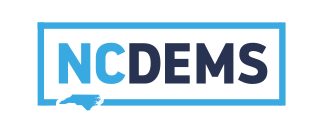
Roy Asberry Cooper III is an American attorney and politician serving since 2017 as the 75th governor of North Carolina. A member of the Democratic Party, he served as the 49th attorney general of North Carolina from 2001 to 2017 and in the North Carolina General Assembly in both the House of Representatives and Senate from 1987 to 2001.

The North Carolina Democratic Party (NCDP) is the North Carolina affiliate of the Democratic Party. It is headquartered in the historic Goodwin House, located in Raleigh.

North Carolina elections to choose members of the Council of State were held November 4, 2008. This coincided with the presidential, U.S. Senate, U.S. House, gubernatorial, and statewide judicial elections.
John S. Arrowood is an American attorney and judge. In April 2017, Arrowood was appointed to the North Carolina Court of Appeals by Governor Roy Cooper, to replace Judge Douglas McCullough, a Republican who resigned one month before he would have reached the mandatory retirement age.

The 2012 North Carolina gubernatorial election took place on November 6, 2012, concurrently with the 2012 United States presidential election, U.S. House election, statewide judicial election, Council of State election and various local elections.

One justice of the North Carolina Supreme Court and three judges of the North Carolina Court of Appeals were elected by North Carolina voters on November 6, 2012, concurrently with the elections for Governor and other offices. North Carolina judicial elections are non-partisan. Terms for seats on each court are eight years. In three of the four races, incumbents were re-elected to their seats, but incumbent Court of Appeals Judge Cressie Thigpen was defeated by Chris Dillon.

Four justices of the seven-member North Carolina Supreme Court and four judges of the 15-member North Carolina Court of Appeals were elected by North Carolina voters on November 4, 2014, concurrently with other state elections. Terms for seats on each court are eight years.

The 2016 North Carolina gubernatorial election was held on November 8, 2016, concurrently with the 2016 U.S. presidential election, as well as elections to the United States Senate and elections to the United States House of Representatives and various state and local elections.

One justice of the seven-member North Carolina Supreme Court and five judges of the 15-member North Carolina Court of Appeals were elected by North Carolina voters on November 8, 2016, concurrently with other state elections. Terms for seats on each court are eight years.

One justice of the seven-member North Carolina Supreme Court and three judges of the 15-member North Carolina Court of Appeals were elected by North Carolina voters on November 6, 2018, concurrently with other state elections. Terms for seats on each court are eight years. These elections were partisan for the first time since the elections of 2002. A law passed by the North Carolina General Assembly in 2017 cancelled primary elections for judicial elections in 2018 only, meaning that an unlimited number of candidates from any party could run in the general election.

The 2020 North Carolina gubernatorial election was held on November 3, 2020, to elect the Governor of North Carolina, concurrently with the 2020 U.S. presidential election, as well as elections to one-third of the United States Senate and elections to the United States House of Representatives and various state and local elections. Incumbent Democratic Governor Roy Cooper was eligible to run for re-election to a second term in office, and announced his intention to do so on December 5, 2019.

Three justices of the seven-member North Carolina Supreme Court and five judges of the 15-member North Carolina Court of Appeals were elected by North Carolina voters on November 3, 2020, concurrently with other state elections. Terms for seats on each court are eight years. These elections were conducted on a partisan basis.

The North Carolina Council of State elections of 2020 were held on November 3, 2020, to select the ten officers of the North Carolina Council of State. These elections coincided with the presidential election, elections to the House of Representatives, elections to the Senate and elections to the North Carolina General Assembly and top state courts. Primary elections were held on March 3, 2020, for offices for which more than one candidate filed per party.

The 2024 United States presidential election in North Carolina is scheduled to take place on Tuesday, November 5, 2024, as part of the 2024 United States elections in which all 50 states plus the District of Columbia will participate. North Carolina voters will choose electors to represent them in the Electoral College via a popular vote. The state of North Carolina has 16 electoral votes in the Electoral College, following reapportionment due to the 2020 United States census in which the state gained a seat.

The 2024 North Carolina gubernatorial election will be held on November 5, 2024, to elect the governor of North Carolina, concurrently with the 2024 U.S. presidential election, as well as elections to the United States House of Representatives, and various other state and local elections. Incumbent Governor Roy Cooper is term-limited and can not seek re-election to a third consecutive term in office. This is the only Democratic-held governorship up for election in 2024 in a state Donald Trump won in 2020. Primary elections took place on March 5, 2024.

Two justices of the seven-member North Carolina Supreme Court and four judges of the fifteen-member North Carolina Court of Appeals were elected by North Carolina voters on November 8, 2022, concurrently with other state elections. Terms for seats on each court are eight years. These elections were conducted on a partisan basis.

The 2022 Alabama elections were held on Tuesday, November 8, 2022. The primary elections were held on May 24, 2022, with runoffs taking place on June 21, 2022.

The North Carolina Council of State elections of 2024 are scheduled to be held on November 5, 2024, to select the ten officers of the North Carolina Council of State. These elections coincide with the presidential election, elections to the House of Representatives, elections to the North Carolina General Assembly and top state courts. Primary elections took place on March 5, 2024, for offices for which more than one candidate filed per party.
Allison Jean Riggs is an American state court judge. She was appointed by Governor Roy Cooper to the North Carolina Court of Appeals, and later to the North Carolina Supreme Court.

The 2024 North Carolina Attorney General election will be held on November 5, 2024, to elect the next attorney general of North Carolina, concurrently with the 2024 U.S. presidential election, as well as elections to the U.S. Senate and various state and local elections, including for U.S. House and governor of North Carolina. Incumbent Democratic Attorney General Josh Stein was eligible to run for re-election to a third term, but has decided instead to run for governor. Republicans have not won an election for Attorney General in North Carolina since 1896, thus since 2019 North Carolina has had the longest streak of any ex-Confederate state of Republicans not having won the state's top legal office.







